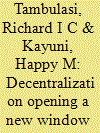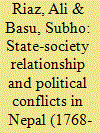| Srl | Item |
| 1 |
ID:
076874


|
|
|
|
|
| Publication |
2007.
|
| Summary/Abstract |
This article evaluates the first four years of decentralized local governance in Malawi with special focus on accountability of local assemblies. The article mainly relies on primary sources such as newspapers, governmental and non-governmental reports and a comparative literature survey. We argue that decentralized local governance in Malawi has enhanced corruption among the local assemblies in relation to their election, awarding of contracts and other related acts. This has consequently led to, inter alia, financial mess in local assemblies, loss of citizen and donor trust as well as low-quality infrastructures. Meanwhile, the democracy and good governance that were envisaged in the creation of local assemblies through the Local Government Act 1998 and the Malawian constitution have seriously been undermined
|
|
|
|
|
|
|
|
|
|
|
|
|
|
|
|
| 2 |
ID:
076872


|
|
|
|
|
| Publication |
2007.
|
| Summary/Abstract |
Theories of democratic consolidation often focus on the role a democratically committed civil society plays in deepening democracy without considering the reasons some groups in civil society are successful while others fail in that endeavor. To more precisely identify the contribution civic groups make, scholars should address both positive and negative outcomes of civic activism aimed at reform. While resource mobilization and political process theories note that success hinges on the differing abilities of civic groups to organize in ways that maximize their leverage over available resources and to mobilize potential participants in the movement, this study of civic groups in Korea shows that what matters most in determining success is not solely how civic groups are organized. The way civic groups convey their message seems to be the decisive factor determining whether their activism leads to democratic reform. This finding - that how civic groups frame their protest helps determine success - can help us more accurately differentiate democratically committed civic group contributions to democratic deepening. This will in turn help us better understand the direction and tempo of that deepening in third-wave democracies. The added emphasis on framing will also result in a more precise theoretical understanding of the relationship between democratic deepening and civil society.
|
|
|
|
|
|
|
|
|
|
|
|
|
|
|
|
| 3 |
ID:
076873


|
|
|
|
|
| Publication |
2007.
|
| Summary/Abstract |
This article examines rural telecommunications access and use among poor village households in the Eastern Cape, South Africa. Discussion is based upon a content analysis of 165 telephone calls, as well as a broader information and communication technology (ICT) ownership, access and use survey undertaken in 50 poor households within a number of rural villages in the Mount Frere district. These data are complimented and supported by qualitative data emerging from a longer-term UK Department for International Development-funded study of ICT use and social communication practices among the urban and rural poor in South Africa. The purpose of the article is to: (i) question existing notions of telecommunications access; (ii) assess the extent to which rural inequalities are exacerbated or ameliorated by telecommunications access; and (iii) examine the extent to which telecommunications are enlisted as a strategic tool by poor households for maintaining kin-based redistributive networks and enhancing livelihood sustainability.
|
|
|
|
|
|
|
|
|
|
|
|
|
|
|
|
| 4 |
ID:
076871


|
|
|
|
|
| Publication |
2007.
|
| Summary/Abstract |
For nearly a decade, from the declaration of Maoist 'people's war' in January 1996 to the formation of new alliance for the restoration of democracy in December 2005, Nepal has experienced a three-way power struggle between Maoist insurgents who want a republic based on egalitarian principles, elected politicians who want an unfettered role in policy making and a monarch bent upon a return to pre-democratic Nepal. This article attempts to explain this crisis from a structural-historical perspective and argues that fundamental to the understanding of this crisis is the state-society relationship. The article contends that the complex use of the constructed Hindu identity to provide cultural legitimacy to the monarchical political order, that has existed since the inception of the state in the 18th century to the democratic revolution in 1990, has contributed to the political alienation of substantial segment of ethnically, socially and economically marginalized population from the Nepalese state. By examining complex interactions among political and economic factors, this article further contends that the unrepresentative process of state formation and the tradition of governance have contributed to the alienation of the citizens from the state and created a political space for violent rebellion and state terrorism undermining fragile but emerging democratic institutions.
|
|
|
|
|
|
|
|
|
|
|
|
|
|
|
|